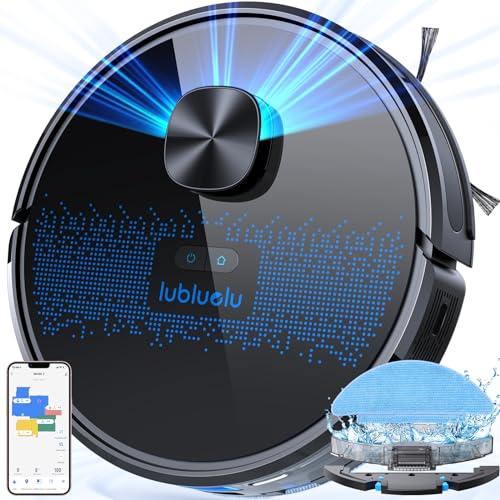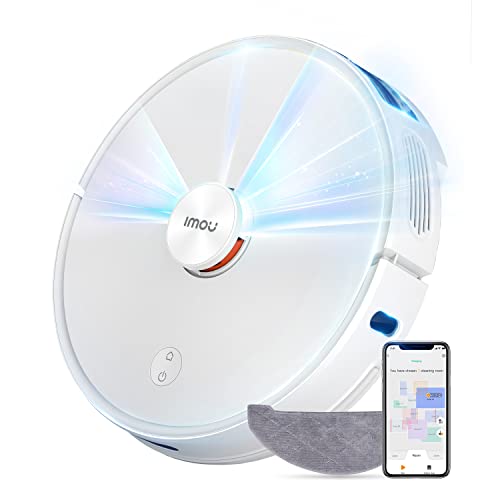Guide To Robot Vacuum Cleaner With Lidar: The Intermediate Guide To Ro…
페이지 정보
A robot vacuum cleaner with lidar, look at more info, is a game-changer. It allows them to map the space more precisely and eliminate obstacles like cords, toys or socks, or ottoman legs.
These models usually include sensors that sense the moment they're about to fall down the stairs. They also come with an easier to use than the budget models. Gyroscope navigation is a popular option, which works as a rotating sensor to determine distances to obstacles within your home.
1. Accurate mapping
Most robot vacuums use a variety of sensors to aid in navigation and find obstacles within your home. Infrared, camera and laser sensors are utilized by the majority of robot vacuums to create an outline map and capture images. Advanced algorithms analyse the data from camera and sensor sensors to give the robot an understanding of your home layout and unique obstacles. The combination of this data allows the robot to design an effective cleaning route and avoid repeating spots, resulting in a more thorough clean.
Lidar sensors can also identify objects on your floor like shoes and toys. These sensors are less affected by lighting conditions than cameras, meaning they will work in both bright and dark spaces. This allows your robot to discover its way around and navigate in tight spaces easily, without having to spend as much time navigating manually.
Lidar sensors are not like infrared sensors which emit light to bounce off objects and measure distances, also detect the shape of the object's surface. This allows the robot to identify and locate objects with greater precision and precisely, particularly those on the floor or on shelves. This stops the robot from accidentally pinging of walls or furniture pieces that could damage it or cause a loss of suction power.
Most robots come with obstacle sensors. However, the top models also have additional navigation technology to make them more precise. YIKO's best robotic vacuum, for example it uses three-dimensional maps to make sure your entire home is cleaned without omitting a spot. This precise mapping ensures your robot reaches all corners of your home including under furniture and other hard to reach areas that may require additional attention.
Other navigation options include wall sensor that prevents the robot from crashing into furniture or walls, and cliff sensor that detects ledges and drops like stairs and stops the vac falling off. Certain models let you set virtual no-go zones within the app, which restrict the robot's movement within certain areas. This improves safety.
2. High-precision navigation
While vision systems like cameras can only provide a limited view of the room, lidar is able to measure distances between objects in a more precise manner. This enables robots to map the entire space and navigate more effectively which makes it easier to cover the entire home.
Lidar sensors function by emitting a laser beam which bounces off the objects in your space and back to the sensor. The sensor then measures the time it takes for the beam to return, and based on this information it creates a 3D virtual map is generated. The robot makes use of this map to determine where to go next, what areas to clean and if it should return to its base to charge.
If your robot has SLAM, it can also utilize this map to create efficient routes as it moves from room to. In our tests, SLAM equipped robots were able navigate rooms with a high level of precision. They were able to move across furniture without hitting it and were able to find their way from one end of the room to the opposite with a minimum of exceptions.
Some of the best vacuum cleaners that come with lidar can detect small obstacles, like piles of dog poop. These types of obstacles could cause damage to a robot when they are entangled in them, so an effective navigation system is essential for keeping your robot clean and safe.
Most robots that have lidar come with other useful features that can enhance your cleaning experience. Many robots have drop detectors to prevent them from falling onto stairs or other height differences. They are also set to return automatically to their base for charging when the battery gets low. These additional features help you keep your home clean with a robotic vacuum.
3. Enhanced obstacle avoidance
The ability of robot vacuums to spot obstacles can be the difference between a clean house and a floor that is ruined and this is why this technology is crucial. Your robot could be stuck on rugs, cords or other obstacles without this technology. The top robot vacuums come with powerful obstacles detection capabilities, allowing them to get around common obstacles easily. This technology can also help the vacuum navigate complex home layouts more efficiently.
Many robot vacuums use a combination of cameras and sensors to map their environment, and advanced algorithms help them understand the space. Some robot vacuums feature advanced features, like 3D Time of Flight mapping (ToF) which makes use of light pulses to bounce off objects and create high-resolution maps. This is particularly useful in dark environments, where standard camera mapping cannot function effectively.
The majority of modern robot vacuums have cliff sensors, which are typically infrared sensors which can sense the moment when the vacuum is near the edge of a staircase or another part of the room. They notify the robot to change its course or turn around, so that it does not slide off the stairs or other edges. Certain models have more advanced features that detect shoes, toys and other small items that the vacuum could get stuck on.
Wall sensors can also make a a big difference in the way your robot vacuum navigates. They prevent it from bouncing against walls or large furniture which can be loud and damage your flooring and paint. Some vacs have enhanced navigation that is based on this technology, which is usually advertised as "edge mode" and can make your robot vacuum cleaner more efficient.
 Other navigation technologies can also be efficient, based on the requirements of your home. For instance, certain robots that have cameras are able to traverse low thresholds, avoid steps, and navigate around fragile objects such as crystal vases. They may not perform better when the light is dim or the lights are turned off. A robot using LiDAR on the other hand can see in dark and is extremely accurate even when placed on a transparent glass surface.
Other navigation technologies can also be efficient, based on the requirements of your home. For instance, certain robots that have cameras are able to traverse low thresholds, avoid steps, and navigate around fragile objects such as crystal vases. They may not perform better when the light is dim or the lights are turned off. A robot using LiDAR on the other hand can see in dark and is extremely accurate even when placed on a transparent glass surface.4. High-efficiency cleaning
A robot vac's navigation skills are essential to how effectively it cleans. The best robot vacuums can create detailed maps of your home and can intelligently plan the most efficient route to clean as thoroughly as is possible. Robots with lidar can perform more than just cleaning. They can also improve their cleaning capabilities with powerful obstacle sensors. Unlike the simple bump sensors of earlier robot vacuums that simply stop when they hit an object, the best robots equipped with lidar are able to detect obstacles and maneuver around them. This lets them take in even the tiniest of dirt particles without losing focus or becoming entangled in a mess.
A high-quality robot vacuum will be equipped with high-efficiency cleaning abilities, allowing it to clean more of your floor in a single go and reach areas that are difficult for other robots to reach. It is also able to easily switch between different types of flooring to another, such as switching from flat hardwood to thick carpeting. This makes it an ideal option for homes that have various flooring types and rooms, which require different cleaning methods.
 The more advanced and sophisticated the robot, the higher it will cost. But the technology that goes into creating the most efficient and efficient robot vacuum robot with lidar cleaners is pretty impressive, especially when you consider that they can perform a chore that many homeowners don't like doing every day. If you're able to spend more money on an automated vacuum, it might be worth paying for the top of the line navigation system that can give you peace of mind knowing your house is always tidy and clean. It's a lot less stress-inducing to use a robot vacuum cleaner than a traditional cleaner.
The more advanced and sophisticated the robot, the higher it will cost. But the technology that goes into creating the most efficient and efficient robot vacuum robot with lidar cleaners is pretty impressive, especially when you consider that they can perform a chore that many homeowners don't like doing every day. If you're able to spend more money on an automated vacuum, it might be worth paying for the top of the line navigation system that can give you peace of mind knowing your house is always tidy and clean. It's a lot less stress-inducing to use a robot vacuum cleaner than a traditional cleaner.- 이전글5 Asbestos Attorneys Projects For Any Budget 24.08.05
- 다음글9 Signs You're A Emergency Auto Locksmith Near Me Expert 24.08.05
댓글목록
등록된 댓글이 없습니다.









